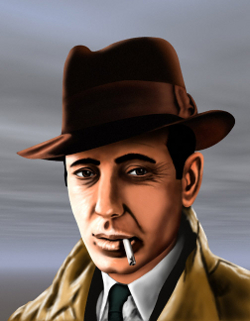Hardboiled crime fiction is a literary style, most commonly associated with detective stories, distinguished by the unsentimental portrayal of violence and sex. The style was pioneered by Carroll John Daly in the mid-1920s, popularized by Dashiell Hammett over the course of the decade, and refined by Raymond Chandler beginning in the late 1930s.
From its earliest days, hardboiled fiction was published in and closely associated with so-called pulp magazines, most famously Black Mask. Later, many hardboiled novels were published by houses specializing in paperback originals, also colloquially known as "pulps." Consequently, "pulp fiction" is often used as a synonym for hardboiled crime fiction. In the United States, the original hardboiled style has been emulated by innumerable writers, including Chester Himes, Mickey Spillane, Ross Macdonald, John D. MacDonald, Robert B. Parker, Sara Paretsky, Sue Grafton, and Walter Mosley.
The term comes from a colloquial phrase of understatement. For an egg, to be hardboiled is to be comparatively tough. The hardboiled detective—originated by Daly's Terry Mack and Race Williams and epitomized by Hammett's Sam Spade and Chandler's Philip Marlowe—not only solves mysteries, like his "softer" counterparts, he (and often these days, she) confronts danger and engages in violence on a regular basis. The hardboiled detective also has a characteristically tough attitude—in fact, Spade and Marlowe are two of the primary fictional models for the attitude that has come to be known as "attitude": cool, cocky, flippant. For extensive detail on the identifying marks of the style, see the history of American hardboiled fiction. -- Wikipedia: Hard Boiled
See: PI, Mancuso Detective Agency, Tony McKenzie, Angelo Mancuso, Mickey (The Rat) Bonieato Spilain

